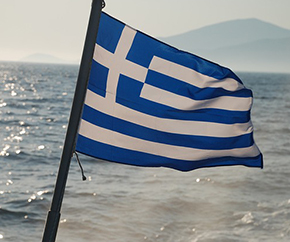In its latest annual report, headlined for the first time by the newly elected President Ms. Melina Travlos, the Union of Greek Shipowners (UGS) highlighted the importance of shipping as a “beacon of stability in the volatile global environment”. “Greek shipping, which ranks first in the world with almost 21% of the world’s tonnage and accounts for 59% of the European Union fleet, has a responsibility to undertake and support initiatives, in order to inform and enlighten the wider public about the strategic importance of the industry and the need for its prioritisation by the political leaders worldwide”, Ms Travlos noted.

Greece remains the top shipowning nation in the world (Figure 1), as Greek shipowners with 5,514 ships currently control approximately 21% of the global fleet, in terms of capacity (deadweight tonnes – dwt)1 . The total capacity of the Greekowned fleet has increased by 45.8% compared to 2014, while even during the COVID-19 pandemic, i.e., since 2019, capacity rose by 7.4%. The Greek-owned merchant fleet transports cargoes between third countries with more than 98% of its fleet capacity, thus being the world’s largest cross trader. Greek shipping is predominantly engaged in bulk/tramp shipping (Figure 2), which is a truly entrepreneurial sector that maintains characteristics of perfect competition: a very large number of private, mainly Small and Medium-sized Enterprises (SMEs), compete globally for business on a daily basis, with flexible, lean and efficient administration and asset management, abundant and transparent access to information, and low entry and exit costs. Shipowners/operators in the bulk/tramp sector are price takers, transporting cargoes on an ad hoc basis. Most vessels in the bulk/tramp trades operate under time charter contracts. The timecharterer assumes the commercial operation of the vessel and determines the cargo type and quantities to be transported, as well as the vessel’s itinerary, routeing and speed.
The Greek-owned fleet represents 59% of the European Union (EU)-controlled fleet (Figure 3), with more than 75% of the EU-controlled fleet being active in the bulk/tramp sector. One third of the Greek-controlled fleet flies an EU Member State flag.
Greek shipowners are constantly investing in new, energy efficient ships and in environmentally friendly equipment, with the average age of the Greek-owned fleet (9.99 years), being lower than the global average (10.28 years). Newbuilding orders from Greek shipowners amount to 173 ships (from 104 ships the year before), corresponding to 17.3 million dwt3. More than one third of the oil tankers and almost one out of six LNG carriers currently being built in the world will be delivered to Greek shipowners. In addition, more than one quarter (27.6%) of the Greek-owned tonnage (in terms of dwt) falls within the scope of the global standard Energy Efficiency Design Index (EEDI), a technical measure of the United Nations (UN) International Maritime Organization (IMO) which ensures an improved energy efficiency for ships.
Read Also: BIMCO And Partners Prepare Software Maintenance Submission To IMO
Greek shipowners have steadily been investing in larger vessels, which also exhibit greater efficiency and environmental gains due to the economies of scale they provide. Since 2014, the growth of the deadweight capacity of the Greek-owned fleet has been much higher than the growth of the number of ships.
While in 2014 the average capacity of a Greekowned ship was 71,308 dwt, today the average capacity of Greek ships is estimated at 86,247 dwt, a figure almost double that of the world fleet (45,020 dwt)5. Ιt is important to note that shipping is the most efficient mode of cargo transport. This can be demonstrated also by the fact that, during the past 50 years (Figure 9), world seaborne trade has quadrupled in terms of volume, while CO2 emissions from shipping have just almost doubled.
In her message, Ms. Travlos noted the following: “In this context, the issue of environmental awareness and the green footprint of shipping is connected to the major issue of climate change. Shipping, as an industry, has timely adopted and implemented an environmental and efficient mode of operation, which is constantly improving. In addition, it continues to be at the heart of legislative spate at both international and regional level, for the adoption of drastic environmental measures, which aim at a complete carbon-free shipping.
Kindly like us on Facebook















